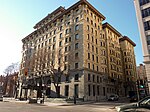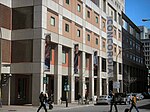2011 Montreal Museum of Fine Arts theft
The 2011 Montreal Museum of Fine Arts theft took place in two separate incidents during September and October of that year. In both instances, the same thief took a small ancient stone piece that was openly exhibited, without a protective case, and smuggled it out of the museum. One has since been recovered; however, the thief remains unidentified and the whereabouts of the other is not known. On September 3, one day before the anniversary of the 1972 robbery of 18 paintings, a visitor took a sandstone Achaemenid Empire relief. In late October, he returned to take a Roman marble head from its pedestal. The two works were collectively valued at $1.3 million, with the relief accounting for almost all of that amount. The museum did not disclose the theft until February 2012 to avoid compromising the joint investigation by its insurance company and Sureté du Québec's art theft unit. Security camera footage allowed them to obtain a description of the thief; investigators believed he was local. A reward was offered for the return of the works. In 2013, police were led to Simon Metke, an Edmonton man who had bought the Achaemenid piece for CDN$1,400 during a visit to Montreal two years earlier, believing it to possibly be a replica, after it was seen on a wall behind him during a CBC interview unrelated to the case. The museum ultimately declined to buy it back from their insurer and it was put on the market in late 2016. Charges laid against Metke were disposed with a conditional discharge after he pled guilty to possession of stolen property. Metke's story inspired a character in Kevin Smith's 2016 film Yoga Hosers, as well as the film's title. The relief itself was later found to have been taken from Iran illegally, and returned there after being seized from a dealer's wares during a New York art fair.
Excerpt from the Wikipedia article 2011 Montreal Museum of Fine Arts theft (License: CC BY-SA 3.0, Authors).2011 Montreal Museum of Fine Arts theft
Avenue du Musée, Montreal Ville-Marie
Geographical coordinates (GPS) Address Nearby Places Show on map
Geographical coordinates (GPS)
| Latitude | Longitude |
|---|---|
| N 45.4987 ° | E -73.5801 ° |
Address
Pavillon Michal et Renata Hornstein
Avenue du Musée
H3G 2E8 Montreal, Ville-Marie
Quebec, Canada
Open on Google Maps








